Christmas in Ukraine is the most beautiful holiday of the year. The whole family gathers on Christmas Eve and spends time together, eating and drinking, talking and singing. But Ukrainian Christmas is a real cultural experience mainly because of the many Ukrainian Christmas traditions. In this article we will tell you how Ukrainians celebrate Christmas, explain the differences to our Christmas and show you what other interesting holidays there are in Ukraine around the New Year.
Christmas in Ukraine – What is it?
Christmas in Ukraine, of course, just like Christmas elsewhere, commemorates the birth of Jesus Christ. Therefore, many traditions here also refer to the story of the birth of Jesus. However, many of the Ukrainian Christmas traditions are also religious traditions. However, these often have their origins in pre-Christian, pagan times.
When is Christmas in Ukraine?
Christmas is celebrated in Ukraine in the churches of the Ukrainian Greek Catholic Church and the Orthodox Church of Ukraine (of the Kyiv Patriarchate) at the same time as in Western Christian countries, but is celebrated according to the Orthodox calendar. Before the changeover to Christmas 2023, it was celebrated from January 6 to 7. Some Ukrainians, such as most members of the Ukrainian Orthodox Church (Moscow Patriarchate), continue to celebrate according to the Julian calendar, i.e. in January. However, December 25 is now a public holiday in Ukraine. Before the occupation by the Soviet Union, many Ukrainians already celebrated Christmas in December.
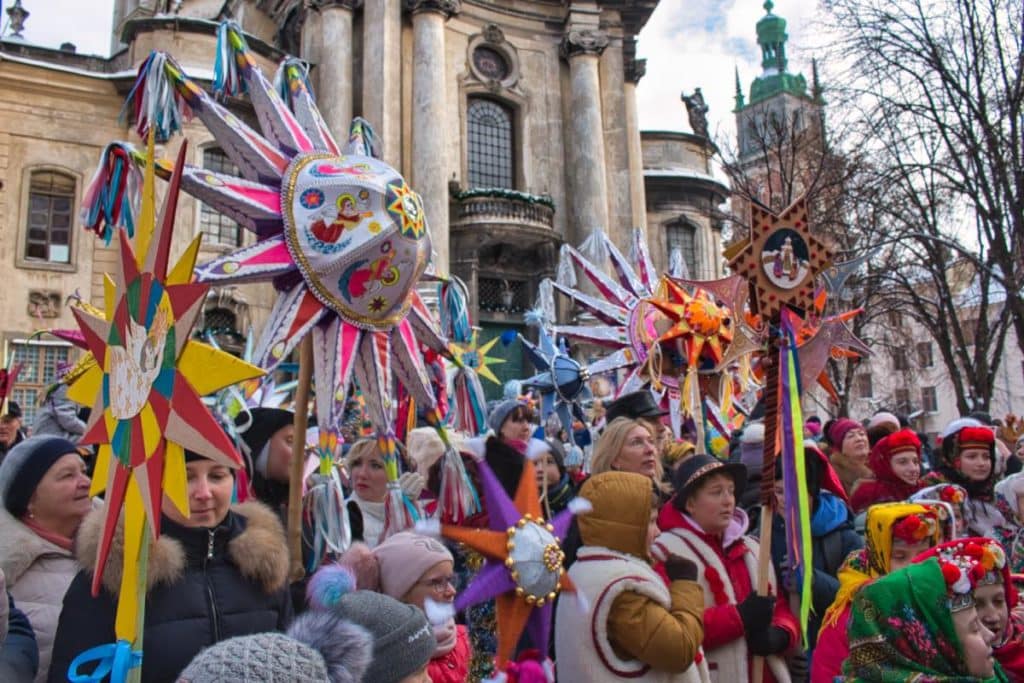
Christmas in Ukraine = Orthodox Christmas?
In Ukraine, it is therefore no longer so easy to say that Ukrainians celebrate Orthodox Christmas in January according to the Julian calendar. After all, most Ukrainians belong to one of the two churches, even if many still belong to the Ukrainian Orthodox Church of the Moscow Patriarchate. Nevertheless, Russia’s war of aggression against Ukraine has also changed the dynamics among the churches and their attitude towards the use of the Gregorian calendar, which is also used by the Catholic Church. However, not all Ukrainians are religious or celebrate Christmas at all. Nevertheless, the role of the churches in Ukraine is quite large.
Christmas under communist rule
Under communist rule, Christmas in Ukraine, as well as in other parts of the Soviet Union, was banned. Since the October Revolution, the Communists went against the churches and all festivals and traditions. Instead, the so-called Yolkafest was celebrated since 1937. Therefore, on New Year’s Eve, a fir tree was erected in Soviet households for this purpose. The “New Year’s tree” or “New Year’s tree” is not originally a Ukrainian tradition, but has thus become naturalized in many households anyway.
The authorities organized festivals and events in the houses of culture. The communists staged the festival as a fight of good against evil. This is also how Ded Moroz came into being – he, too, is a Soviet invention and was the counterpart to the capitalist Santa Claus and evil figures such as Baba Yaga, the wicked witch. This is also how the Soviets already used communist ideology to influence the youngest children.
Ukrainians resisted secretly
But especially in Ukraine, many people nevertheless remained deeply religious and celebrated Christmas underground. People moved secretly to their relatives’ homes on Christmas Eve and celebrated there in silence. Priests often had jobs as ordinary workers and preached in their spare time. To discourage Christmas celebrations, authorities often even imposed extra shifts or otherwise tried to discourage citizens from celebrating in a religious setting. Nevertheless, Ukrainian traditions survived through the Soviet era and are celebrated today as they once were.
How is Christmas celebrated in Ukraine?
Christmas in Ukraine is celebrated mainly on Christmas Eve and Christmas Day. However, only Christmas Day is a public holiday in Ukraine. Nevertheless, most Ukrainians who celebrate Christmas already take Christmas Eve off. Especially the women, who are responsible for cooking in the traditional Ukrainian family, are sometimes busy preparing the dishes days before.
Christmas Eve in Ukraine
During the day and into the evening, many Ukrainians, especially if they live in the countryside, visit their relatives. They go from house to house, usually eating something or bringing small gifts. Traditionally, Christmas in Ukraine is celebrated at home in the circle of the immediate family. It usually begins with the appearance of the first star in the firmament. Whereby the star does not have to be visible. At this time, there should be a total of 12 dishes (more on this in a moment) on the table. The meal is usually opened with a prayer by the oldest living member of the family. Here the food is blessed.
Christmas traditions in Ukraine
Many of the Christmas traditions reflect ancient rites that still originate from Slavic pagan customs. Thus, Christmas as a celebration of the family is not only a celebration for the living family members, but the Ukrainians also commemorate the deceased relatives. Therefore, traditionally there is always an empty plate with cutlery in the window, so that the deceased ancestors can help themselves to the food. Under the tablecloth, hay is usually laid out, which is supposed to remind of the birth of Christ. At the corners of the table are nuts and garlic, which are supposed to provide health and strength.
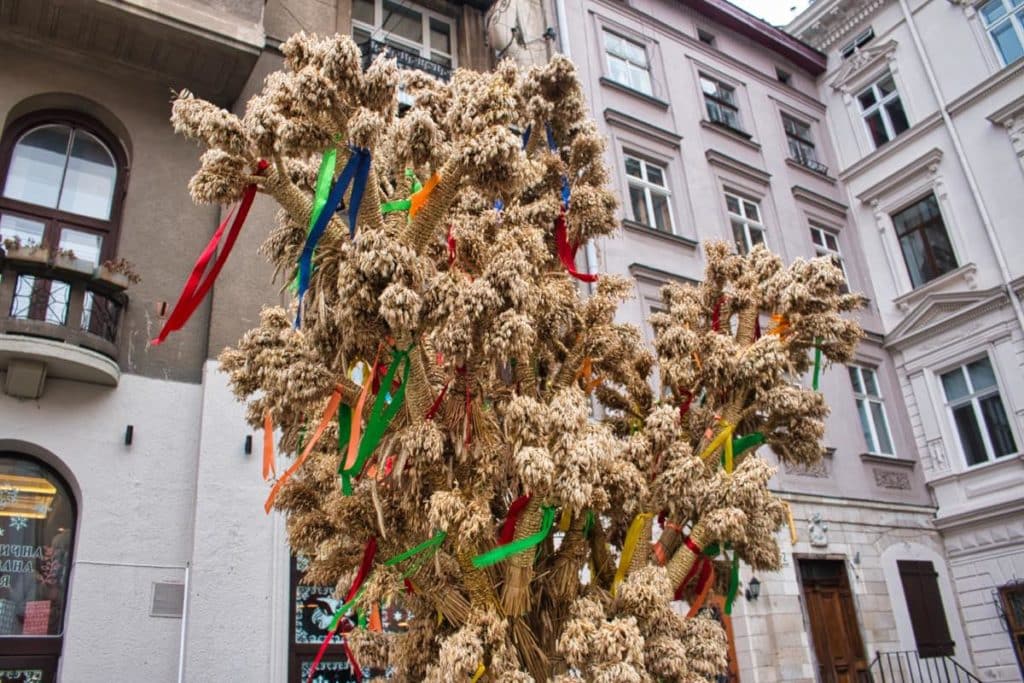
Diduch – symbol of the spirits of the ancestors and the harvest
Another tradition is the so-called diduch. It is a bunch of ears of corn from the first harvest of the previous year. Diduch translates as “spirit of the ancestors” and it symbolically represents them. For Ukrainians, it also represents the wish for a good harvest in the coming year.
12 Lenten dishes
Anyone who thinks that a lot of food is eaten at Christmas in the West has probably never been to a Ukrainian Christmas dinner. On the table are traditionally 12 dishes, a reference to the 12 apostles. All dishes are fasting dishes. This means that they do not contain meat or milk, because Christmas Eve is the last evening of the fasting period before Christmas.
Therefore, fish is often on the table, in the form of herring or pike. Important other dishes are mainly a vegetarian borscht, which contains small dumplings (in Ukrainian, ears), as well as pancakes (doughnuts), vareniki with potato filling or even dishes with beet. Actually, on Christmas Eve, as a fasting day, people are not allowed to drink. However, Ukrainians like to drink a lot on Christmas Eve and toast together.
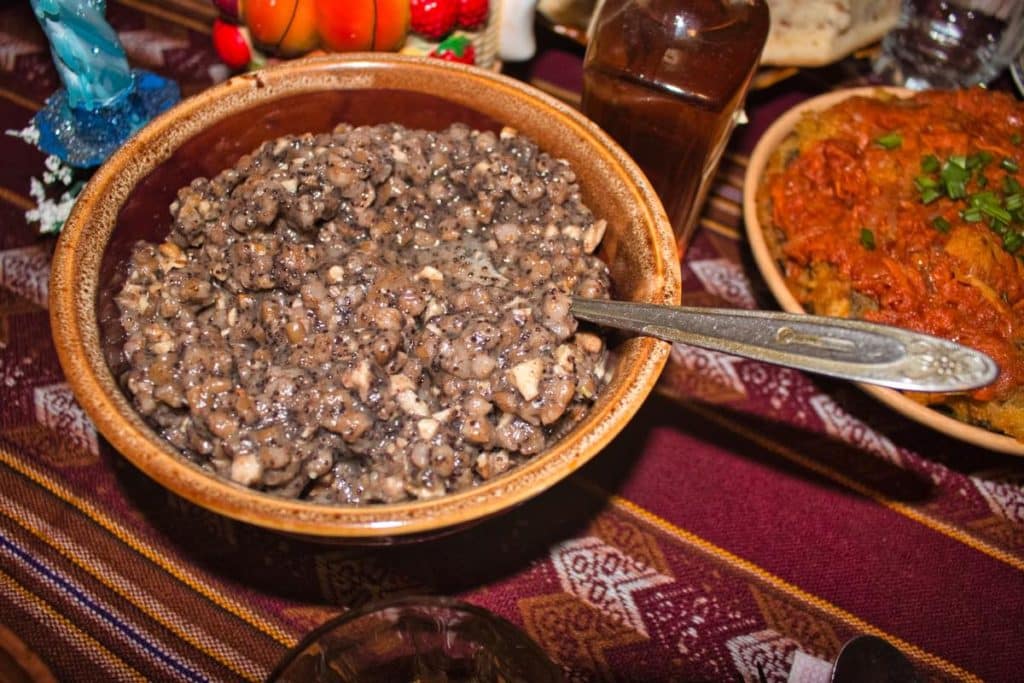
Kutya
However, the most important dish of the 12 Lenten dishes is called kutya. Kutya is traditionally served first on Christmas Eve in Ukraine. It is prepared from boiled wheat grains, poppy seeds, honey and, depending on the family, other ingredients such as raisins and nuts. Each member of the family must eat at least one spoonful of the kutya. In mythology, it is said that the head of the family can guess how the coming year will be by the thickness of the kutya.
Vertep – Nativity play
There is also a Nativity play in some Ukrainian towns. For this, performers get together in costume and re-enact the birth of Jesus.
Star singers
Even though the day of the carol singers (Ukrainian: Kolyadniki) is not until January 8, many groups of mostly young carol singers already go through the streets on Christmas Eve after dinner, ring the bells of the residents, sing Christmas carols and ask for donations. Most of the time, the singers are also dressed up. In the Carpathians and in rural areas of Ukraine, even larger parades sometimes take place for this purpose.
Christmas spider
If the family has a Christmas tree, it is usually decorated with woven “spider webs”. According to a legend, a poor woman had not been able to decorate her tree. During the night, spiders wrapped the tree. At the appearance of the first rays of sunlight, the spider webs then turned to gold and the family was no longer poor. However, this legend and the tradition are not know to everyone in Ukraine.
Special Christmas greetings in Ukrainian
Another nice tradition are certain special greetings, which are pronounced only at Christmas. Ukrainians may simply wish a Веселих свят! (Veselykh Svyat), which means something like “Merry Christmas”. The most appropriate greeting, especially for religious people, is Христос народився! (Khrystos narodivsya) – “Christ was born”. For this there is also only one suitable answer: Славімо його! (Slavimo yoho) – “Praise Him!”. Even though I personally am not very religious, I find this tradition very beautiful and I always answer eagerly. By the way, many Ukrainians are very precise about this and greet with this greeting only from January 7, since Jesus is said to have been born on January 7.
Christmas Day in Ukraine
Christmas Day is the day most families attend church. Some churches start very early with the Christmas service. This can also last up to four hours. In Orthodox churches, however, there is no seating, so the entire service must be done standing. After this effort, the family gathers back home and has lunch together. Now that Lent is over, it is not uncommon for meat to be served. No one goes home hungry here.
Christmas gifts in Ukraine
There are no gifts in Ukraine on Christmas Eve or Christmas Day. Gifts are given on St. Nicholas’ Day, as they were in other countries like Germany at one time. However, this is not celebrated on December 6, but according to the Orthodox calendar on December 19. By the way, it is also the name day of all Ukrainians with the name Mykola (Nicolas). The name day is usually as important as the birthday and is often celebrated as well. Mykola is also quite a popular name in Ukraine.
Christmas carols from Ukraine
Christmas carols also play a very important role in Ukraine. They are an opportunity for Ukrainians to cultivate their faith and the Ukrainian language. Many families sing together on Christmas Eve and carol singers also stop by. By the way, did you know that one of the most famous Christmas carols ever is based on a Ukrainian song. The so-called Carol of the Bells goes back to the traditional Ukrainian song Shchedrik.
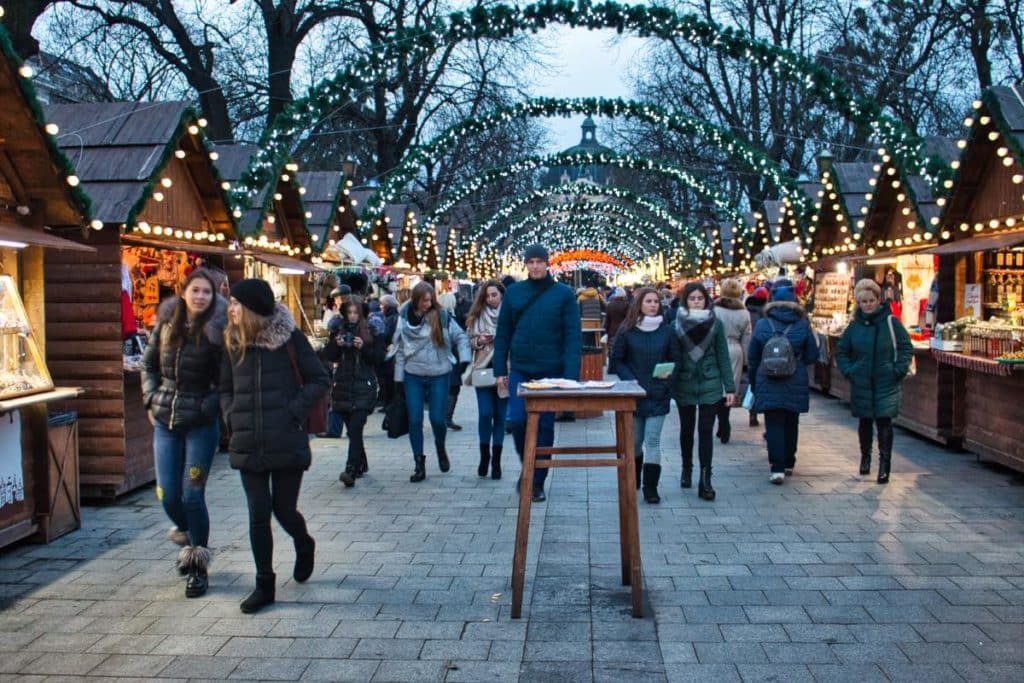
Christmas markets in Ukraine
Christmas markets are not traditional in Ukraine. However, they have become very popular throughout the country. From Lviv to Kharkiv, Christmas markets are held everywhere. The most beautiful is the one in Lviv, which spreads out in the market and in front of the opera and has reached a respectable size. There is also a big Christmas market in Kyiv. Here, as in other European countries, you can buy all kinds of handmade souvenirs, delicacies and other nice things.
Other holidays in Ukraine at Christmas and New Year
Even in Ukraine the calendar of holidays does not end with Christmas. On the contrary, there are still a lot of very beautiful and interesting celebrations in Ukraine.
Shchedryi vetshir
The evening before the Orthodox New Year (more on that in a moment) is also called Щедрий вечір (Shchedryi vetshir) – bountiful evening. On this evening, the family gathers again and celebrates something like a second Christmas Eve. This time there is plenty of food, because the more there is on the table, the better the year will be. However, this time without fish, because it is supposed to bring bad luck.
Old New Year
Since the Orthodox Julian calendar differs by 13 days from the Western Gregorian calendar, New Year’s Day also takes place 13 days later. For Orthodox believers, the New Year thus begins on January 14. This feast is therefore also called the “Old New Year” and is still celebrated in many families as a small festival.
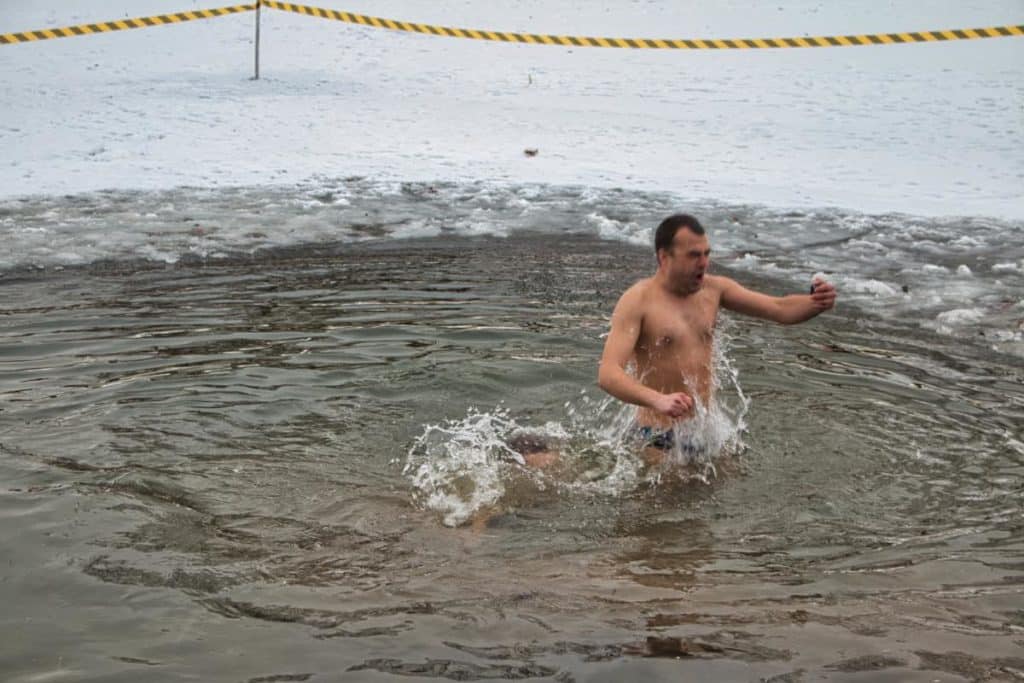
Ice bath – baptism of Jesus
Even in the West, many are probably familiar with the images of Russians and Ukrainians bathing in ice. Although today this often takes place on New Year’s Day, the traditional day for ice bathing is actually January 19. In Ukraine, the day is also called Jordan Day, as it commemorates Jesus’ baptism in the Jordan River. As a symbol of Jesus’ baptism, many Ukrainians therefore go swimming on this day in the ice-cold, often frozen lakes and rivers after a priest has said a blessing. In this way, old sins can be washed away. However, the ice bathers are very strict about this. You have to put your head under water at least three times. Otherwise it does not count.
Celebrate Christmas in Ukraine
Since Christmas is not celebrated in the same traditional way everywhere in Ukraine, you can experience a real Ukrainian Christmas best in Western Ukraine. In Lviv there are many parades and good restaurants with Christmas food. I own the tour company Lviv Buddy there myself and we offer Christmas tours that include a traditional Christmas dinner.
You can also celebrate Christmas in the Carpathians and experience the real Ukrainian customs up close. This is a real experience and gives you great insights into Ukrainian culture.
Book tip for refugees
Many people had to flee their homeland due to the Russian attack and have now found shelter in Germany. Our colleague Markus Bingel, together with a mother who stayed with him for a while, has written a language guide to help Ukrainians in Germany. Not only is the grammar of the German language explained here in a simple and understandable way, but there are also several chapters that help you to communicate, for example at the doctor’s, at school or when dealing with the authorities.
No products found.


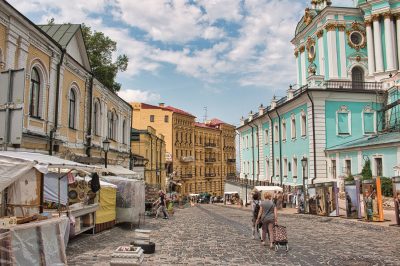
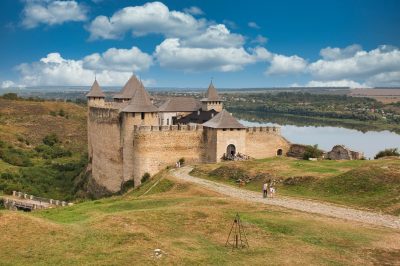
Love it, great job!
This is helping out a lot for my research for school.
Love this website